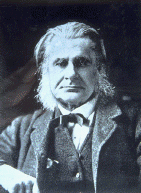
“Darwin’s Rottweiler” is what they called him. After Darwin, an Englishman, announced his Theory of Evolution, the idea came under vigorous attack particularly in the press and by the Church of England. Darwin was a shy man, not prone to hostility and public debate. He and his theory needed a champion. Huxley became that champion. Darwin, along with Alfred Wallace, created the explanation for “evolution,” but it was Thomas Huxley who sold the idea to the world.
Life in the London Slums
Thomas Huxley grew up at a time when England was in the worst depression of the century. Few people there had jobs. He lived in a squalid area of East London, characterized by fetid alleys, bars, and dance halls. Many people there were starving.
Thomas was an apprentice to a druggist in that part of town. People there were constantly begging him for medicine and for help for their misery. Thomas was high strung and sensitive and their misery left him scarred for life. He spent his nights in a tiny room by the shipping port. There he would escape the misery around him the only way he could — by dreaming of better things.
A Strange Family
Unlike Darwin, Thomas had no fortune to inherit and no family tradition to uphold. His father was considered intelligent but he was poor. He was a math teacher in a minor public school in a country town West of London.Young Thomas was noted for having a quick temper and for being stubborn, like his father. His only obvious talent was drawing. Many years later this talent for drawing would serve him well, as he drew anatomical details of many new species of animals. Photography was not available in those years. Thomas’ mother was a lower-class ” Cockney ” and was 40 years old when she gave birth to Thomas, who was her sixth and last child. She is said to have “lightning intuition.” “Things flash across me,” she would say. Thomas had great affection for his mother, but little for his father.
Family life was strange. Thomas barely knew his siblings because they were all much older. He did not like his brothers; they were too much like him – intensely selfish. He was alone a lot. His temper added to the problem of making friends. Years later, someone described him as “one of the most secretive and thin-skinned mortals in the world.” Tom got most of his nurturing from his sister, Lizzie. She helped Tom acquire religious training and helped him learn some French and German. Tom developed an interest in the German philosopher, Goethe.
He first went to school, the school where his father taught, at age 8. He was there for two years and that was all the formal education he ever had. He remembered nothing, except whipping the school bully. The school enrollment had fallen so much that his father had to quit because the family could not live on his income. The family moved to Coventry, where his grandfather ran a old country inn. This was an area of England where silk-weaving was the main business. Children at the age of six went to work weaving silk. The village was also populated by coal miners who generally lived in filth. The village was full of pregnant 16-year old girls destined to a life of despair and drudgery. The people were clannish and did not accept outsiders like Thomas and his family. The family was still poor, and there was no money for Thomas’ education.
